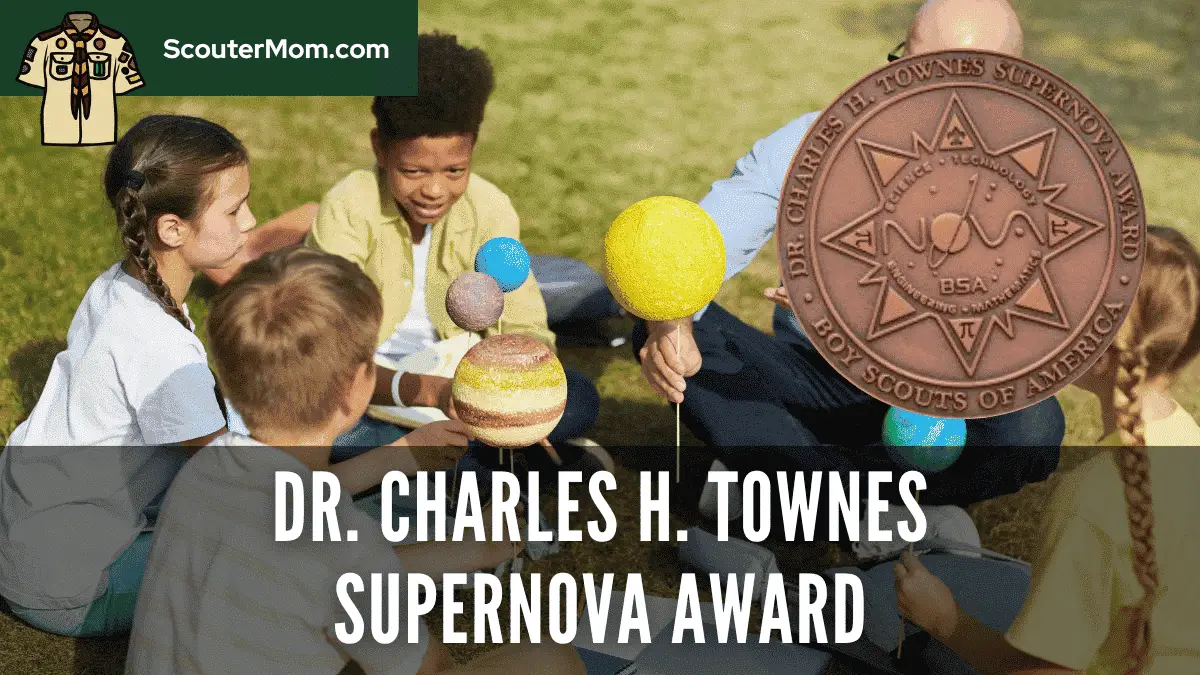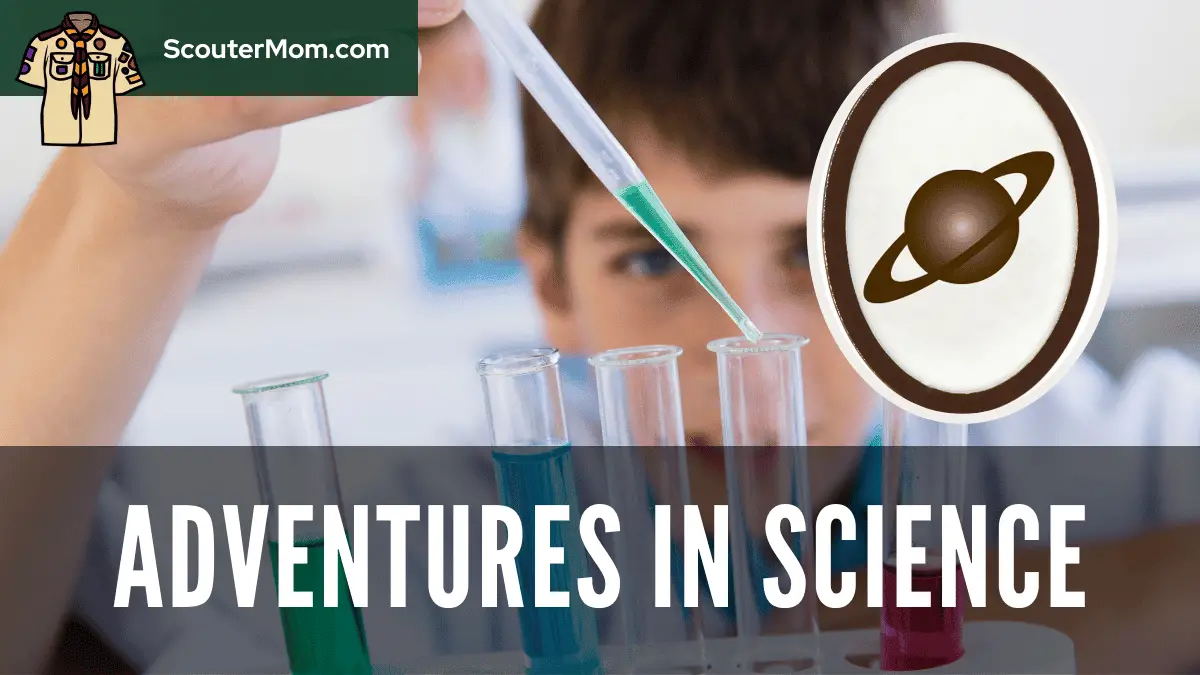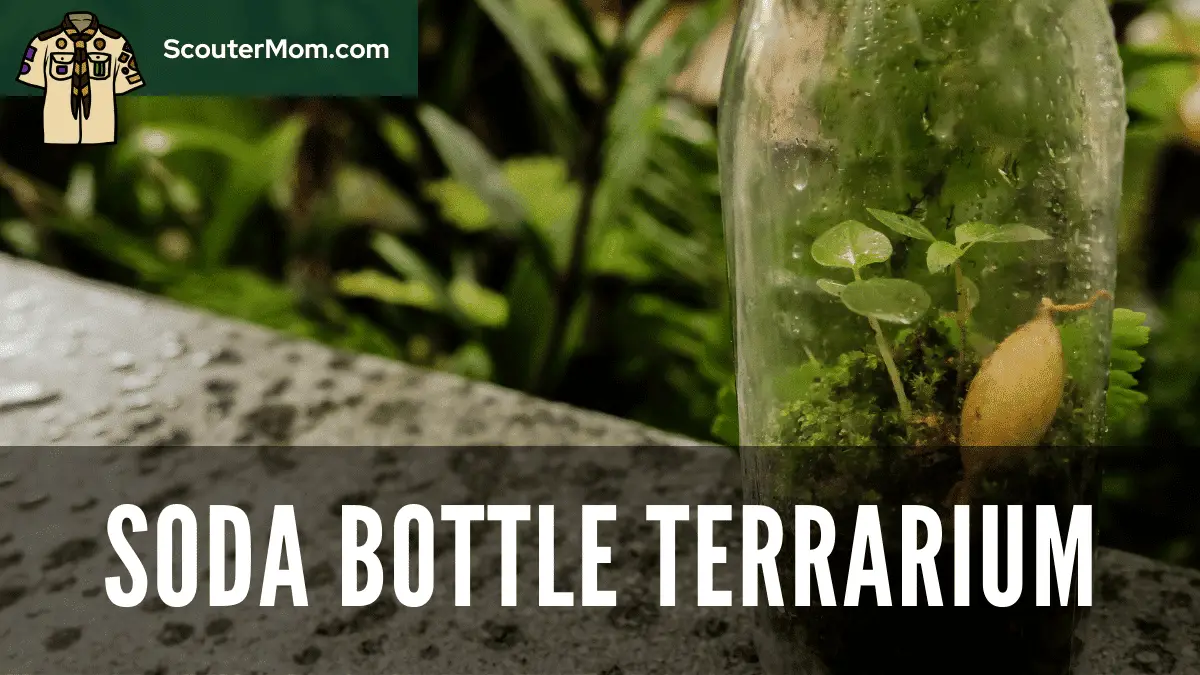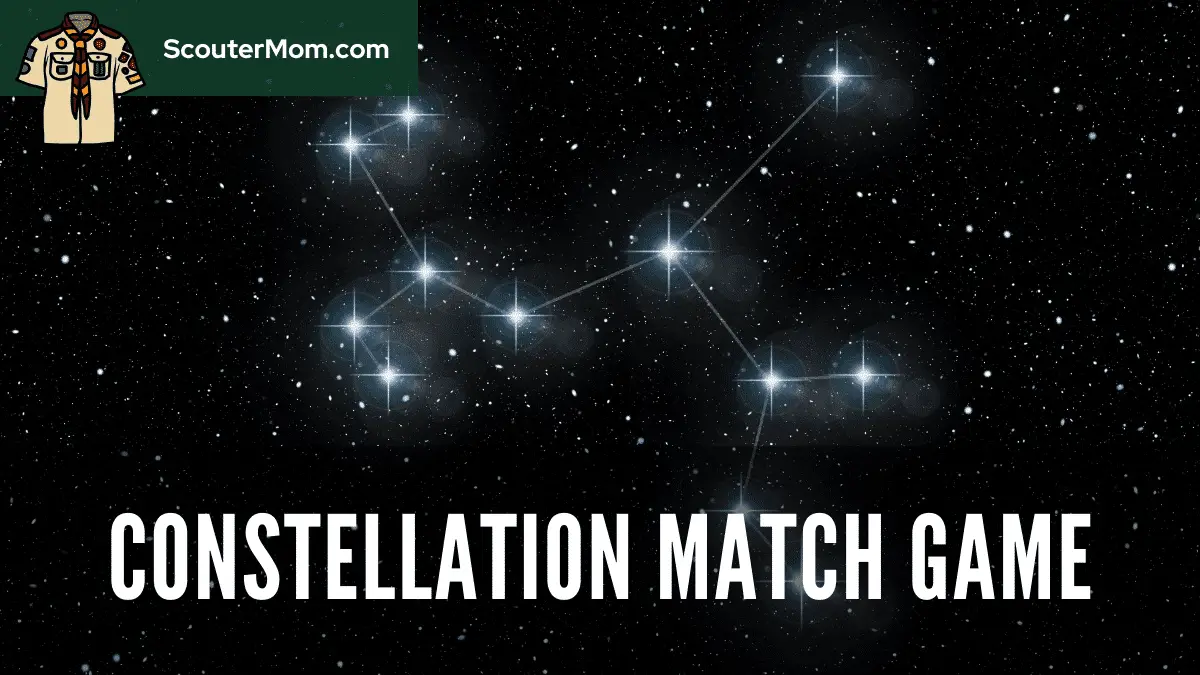
The Dr. Charles Townes Supernova Award can be earned by Webelos who want to learn more about science, technology, engineering, and mathematics.
Helps for the Requirements
Dr. Charles H. Townes Supernova Award for Webelos
See the complete requirements for the Dr. Charles H. Townes Supernova Award
Helps and Answers for the Dr. Charles H. Townes Supernova Award Requirements
Requirement 1: Adventure and Project
Requirement 2: Adventure and Experience
Requirement 3: Learn about Dr. Townes
Requirement 4: Learn about Other Scientists
Requirement 5: Why Are Math and Science Important?
Requirement 6: Science Project
What Is a Supernova Award?
The Supernova Awards recognize Scouts who delve deeply in to science, technology, engineering, and mathematics (STEM) activities as part of their Scouting experience.
How Do You Get the Dr. Charles H. Townes Supernova Award?
To earn the Dr. Charles H. Townes Supernova Award, Webelos must complete the Adventures in Science or Engineer adventure. They also do some activities related to geocaching, wildfires, rockets, constellations, aquariums, or terrariums. Cub Scouts investigate the scientific method and famous scientists.
Although it is not a requirement, it is recommended that you earn at least two Nova awards for Cub Scouts before earning the Dr. Charles H. Townes Supernova Award.
Explore the world of science, technology, engineering, and mathematics further with the helps for these requirements below
Dr. Charles H. Townes Supernova Award Requirement 1: Adventure and Project
1. Complete three of the following: Adventures in Science, Engineer, option A, or option B.
Option A: Do all of the following: (a) Construct one of the following from wood, and one from another material: Book rack, Shelf, Bulletin board, Tie rack, Letter holder, Notepad holder, Toolbox, Towel rack, Recipe holder, Lamp stand, Kitchen knife rack, Kitchen utensil rack, Napkin holder, Garden tool rack, Lid holder, Mailbox, Birdhouse, Desk nameplate, Letter, bill, and pencil holder, Bread box, Key rack, Measuring cup rack, Measuring spoon rack (b) Keep an “insect zoo” with insects that you have collected. You might have crickets, ants, or grasshoppers. Study them for a while then release them. Share your experience with your den or your Mentor. (c) With adult supervision, show how to check the oil level and tire pressure on a car.
Option B: Do all of the following: (a) Take a field trip to a geological site, geological laboratory, or rock show. Discuss what you learned at an upcoming den meeting or with your mentor. (b) Construct a simple working electrical circuit using a flashlight battery, a switch, and a light. (c) Do five activities within your home or school that require the use of mathematics. Explain to your den or your Mentor how you use math every day.
Requirement 1 Helps and Answers

Engineer
For the Engineer adventure, youth learn about how engineers design new things and make two projects of their own.

Adventures in Science
Note: BSA retired this adventure on May 31, 2022. However it appears that Webelos can still do the requirements to fulfill part of Dr. Charles H. Townes Supernova Award.
Gourd Birdhouse
Use dried gourds to make a birdhouse. If you didn’t grow any yourself, you can probably find some in your area at a farmer’s market or even a craft shop. This can be used for one of the Dr. Charles H. Townes Supernova Award requirements.
Pot and Towel Rack Camp Gadget
These instructions are for a pot and towel drying rack. There is a small picture of a similar gadget in the Scouts BSA handbook.
Dr. Charles H. Townes Supernova Award Requirement 2: Adventure and Experience
2. Complete three of the following: Build It, First Responder, Into the Wild, Into the Woods, option A or option B.
Option A: Do two of the following: (a) Go on a geocaching adventure with your den or family. Show how you used a GPS unit or a smartphone with a GPS application to locate a geocache. (b) Describe both the benefits and the harm wildfires can cause in a forest ecosystem. Tell how you can prevent wildfire. (c) Set up an aquarium or terrarium. Keep it for at least a month.
Option B: Do both of the following: (a) With adult supervision, build and launch a model rocket. Describe how Newton’s third law of motion explains how the rocket is propelled into the sky. (b) While on a campout or night hike, identify five constellations or satellites in the night sky.
Requirement 2 Helps and Answers
Finding the Big Dipper, the North Star, and the Little Dipper

Build It
For the Build It adventure, youth learn about using tools safely and carpentry. Then they use what they have learned to build a project.

First Responder
For the First Responder adventure, youth learn some basic first aid and emergency preparedness skills. They learn to respond to situations like choking, shock, bites and stings, cuts, cuts, burns, and more.

Into the Wild
Youth working on the Into the Wild adventure learn all about nature. They can choose to observe insects, reptiles, amphibians, fish, mammals, or birds. They also find out about ecosystems and the balance of nature.

Into the Woods
Youth learn about forestry while doing the Into the Woods adventure. They will study different types of trees and how they grow. They will also consider why trees are important and learn about ecosystems.

Make a Soda Bottle Terrarium
Making a soda bottle terrarium is a great springtime activity. Plus – it reuses a plastic soda bottle, which is great for starting a discussion about Earth Day approaching.

Constellation Matching Game
This constellation matching game will add fun to any astronomy focused meeting or achievement. It will also familiarize youth with some of the constellations. The drawings behind the constellations will help them understand why they are named for people or animals.
Finding the Big Dipper, the North Star, and the Little Dipper
Astronomy is fun for all ages. A good starting point is to locate the North Star and constellations in the night sky. Since the easist way to find the North Star is to locate the Big Dipper and then the Little Dipper, they can do this requirement pretty easily.
Pin Hole Planetariums
Pinhole planetariums are fun for Scouts to make because the creation process involves hammers, nails, and flashlights. And they encourage Scouts to look up at the night sky to see what they have learned about constellations. This makes a fun way to prepare to identify constellations for the Dr. Charles H. Townes Supernova Award.
Dr. Charles H. Townes Supernova Award Requirement 3: Learn about Dr. Townes
3. Find interesting facts about Dr. Charles H. Townes using resources in your school or local library or on the Internet (with your parent’s or guardian’s permission and guidance). Then discuss what you learned with your mentor, including answers to the following questions: What very important award did Dr. Townes earn? What was Dr. Townes’ most famous invention?
Requirement 3 Helps and Answers
What very important award did Dr. Townes earn?
Dr. Townes was an American physicist who was awarded the Nobel Prize in Physics in 1964 for the creation of the maser. Maser stands for Microwave Amplification by Stimulated Emission of Radiation. In addition to the Nobel Prize, Townes received the Templeton Prize, for contributions to the understanding of religion.
What was Dr. Townes’s most famous invention?
His most famous invention is the maser. A maser is an intense, highly focused beam of high-frequency radio beams. It is used to study background radiation in space. A maser can also be used to amplify weak signals from deep space spacecraft, allowing NASA to maintain communication. He and his assistants also detected the first complex molecules in interstellar space and first measured the mass of the black hole in the center of our galaxy.
Dr. Charles H. Townes Supernova Award Requirement 4: Learn about Other Scientists
4. Find out about five other famous scientists, technology innovators, engineers, or mathematicians approved by your mentor. Discuss what you learned with your mentor.
Requirement 4 Helps and Answers
Some Scientists to Learn About
- Archimedes
- Leonardo da Vinci
- Copernicus
- Galileo
- Isaac Newton
- George Washington Carver
Dr. Charles H. Townes Supernova Award Requirement 5: Why Are Math and Science Important?
5. Speak with your teacher(s) at school (or your parents if you are home-schooled) OR one of your Cub Scout leaders about your interest in earning the Webelos Scout Supernova award. Ask them why they think math and science are important in your education. Discuss what you learn with your mentor.
Dr. Charles H. Townes Supernova Award Requirement 6: Science Project
6. Participate in a science project or experiment in your classroom or school. Discuss this activity with your mentor.
Requirement 6 Helps and Answers
Science Projects and Experiments
- Storm In A Glass: Model A Rainstorm In A Glass
- Snow Globe: Craft a Decoration using Viscosity
- Jello Lenses: Glasses Formed of Jello
- Dancing Hearts
- Fizzy Fruit
- Paper Hovercrafts
- Balloon Pop!
- and more….
Dr. Charles H. Townes Supernova Award Requirement 7: STEM Careers
7. Do ONE of the following:
- Visit with someone who works in a STEM-related career. Discuss what you learned with your mentor.
- Learn about a career that depends on knowledge about science, technology, engineering, or mathematics. Discuss what you learned with your mentor.
Requirement 7 Helps and Answers
Some STEM Careers
- Software Developer
- Environmental Engineer
- Marine Biologist
- Nurse
- Veterinarian
- Robotics Engineer
- Statistician
- Physical Therapist
Dr. Charles H. Townes Supernova Award Requirement 8: The Scientific Method
8. Under the direct supervision of your mentor, do an experiment that shows how the scientific method (or scientific process) is used. Prepare a short report on the results of your experiment for your mentor.
Requirement 8 Helps and Answers
A Simple Explanation of the Scientific Method
If you don’t have a background in science, helping your Cub Scout out with this might seem a little intimidating. But the scientific method is really very basic and only involves a few simple concepts. Read more.
Dr. Charles H. Townes Supernova Award Requirement 9: STEM Activity
9. Participate in a Nova- or other STEM-related activity in your Webelos Scout den or pack meeting that is conducted by a Boy Scout or Venturer who is working on his or her Supernova award. If this is not possible, participate in another Nova- or STEM-related activity in your den or pack meeting.
Requirement 9 Helps and Answers
Find Scouts BSA or Venturers Near You
You can use the Be A Scout website to locate troops and crews near you to help with this requirement.
Dr. Charles H. Townes Supernova Award Requirement 10: Application
10. Submit an application for the Webelos Scout Supernova award to the district STEM or advancement committee for approval.

